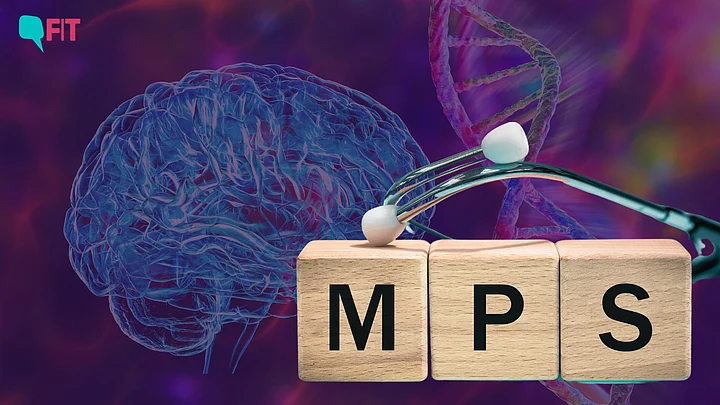Mucopolysaccharidoses (MPS) are a group of rare genetic disorders that affect how the body breaks down certain complex carbohydrates and substances.
In people with MPS, the deficiency of the specific enzymes responsible for breaking down these sugars leads to abnormal accumulation of mucopolysaccharides in cells, tissues, and organs.
This accumulation triggers a range of progressive damage and health problems affecting multiple body systems.
Each year, 15th May is observed as International MPS Day, aimed at spreading awareness about it. Here's what you should know about this rare disease.
Understanding MPS I and MPS II
There are several types of MPS, each with its unique genetic cause and set of symptoms.
The most common types include MPS I (Hurler syndrome) and MPS II (Hunter syndrome).
MPS I, the most common type of Mucopolysaccharidoses, manifests as a deficiency in lysosomal alpha-L-iduronidase (which is needed to break down certain sugars), resulting in glycosaminoglycan build-up and diverse health issues.
This deficiency can cause physical changes like coarse facial features, joint stiffness, and enlarged organs such as the liver and spleen.
People with MPS I may also experience breathing difficulties, heart problems, and developmental delays.
On the other hand, MPS II, also known as Hunter syndrome, occurs due to a lack of the enzyme iduronate-2-sulphatase.
This enzyme deficiency leads to the glycosaminoglycan accumulation of sugars in tissues and organs, resulting in symptoms such as joint stiffness, changes in physical appearance, breathing problems during sleep, and multi-systemic complications.
How can you tell if your child has MPS?
In kids, look out for the following telling signs:
Delay in growth landmarks
skeletal and cardiac abnormalities
macrocephaly (an abnormally large head)
A disproportionately short neck and broad chest
Delayed tooth eruption
Progressive hearing loss
Hepatosplenomegaly (enlarged liver and spleen)
The child could also exhibit normal to mild to moderate learning disability, affecting cognitive development.
Early signs may include frequent infections, growth delays, distinctive facial features, joint problems, and organ enlargement.
Diagnosing MPS involves a combination of physical exams, genetic testing, and imaging studies like X-rays.
Doctors look for characteristic physical features associated with MPS, measure enzyme levels in the blood or urine, and perform genetic tests to confirm the specific type of MPS.
Early Diagnosis is Key
Treatment for MPS focuses on managing symptoms and improving quality of life. This may include enzyme replacement therapy (ERT), where missing enzymes are replaced through injections, stem cell transplants to replace faulty cells with healthy ones, and symptom management strategies to address issues like heart problems, joint stiffness, and breathing difficulties.
Early identification empowers healthcare teams to commence targeted therapies promptly, mitigating disease progression and optimising the quality of life for individuals with MPS.
Emphasising the value of early diagnosis, healthcare initiatives worldwide stress the importance of new-born screening programs and genetic testing.
Advancements and Challenges in MPS Care
In India, significant strides have been made in MPS care, highlighted by financial assistance initiatives and the availability of approved therapies.
The National Policy for Rare Diseases provides financial assistance of 50 Lakh per patient, offering crucial support to families grappling with the high costs of specialised care, treatments, and therapies.
However, challenges still exist, notably in ensuring equitable treatment access across all disease categories.
A pressing concern in the MPS community is the equitable distribution of treatment resources. A long-time awaited intervention is warranted to establish sustainable funding mechanisms, ensuring that all eligible patients receive comprehensive care and life-saving therapies.
Setting up a central committee is imperative to monitor management outcomes of patients on therapy.
This inclusivity is very crucial in safeguarding the well-being of individuals suffering from rare diseases.
A strategic allocation of resources, combined with enhanced healthcare infrastructure and streamlined policies, is key in championing the cause of MPS patients and fostering a resilient healthcare ecosystem.
Designated Centres of Excellence (CoEs) must prioritise eligible MPS patients to optimise treatment outcomes and bridge existing healthcare disparities.
Only by advocating for tangible changes that empower individuals with MPS to lead fulfilling lives despite their unique challenges, can we collectively overcome this mammoth challenge.
(Dr Ratna Puri is a senior consultant for medical genetics at the Sir Ganga Ram Hospital in New Delhi. Her areas of interest are management of clinical genetics, inborn errors of metabolism, dysmorphology and prenatal diagnosis.)
(At The Quint, we question everything. Play an active role in shaping our journalism by becoming a member today.)
